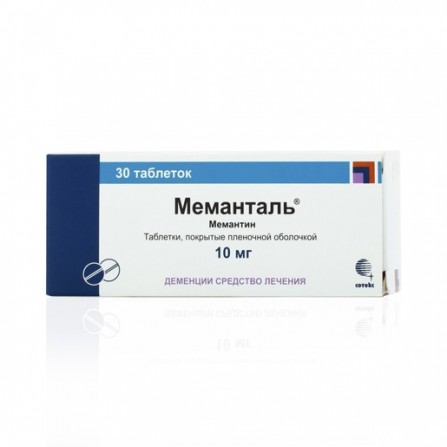Memantale film-coated pills 10 mg N30
Condition: New product
1000 Items
Rating:
Be the first to write a review!

More info
Active ingredients
Memantine
Release form
Pills
Composition
Tablets, film-coated, composition (1 tab.): Active substance: memantine hydrochloride - 10 mg in ancillary substance: lactose monohydrate - 149.75 mg; MCC - 27.1 mg; talc - 11.15 mg; colloidal silicon dioxide - 1.25 mg; magnesium stearate - 0.75 mg of the membrane: Opadry white (lactose monohydrate - 2.16 mg, hypromellose - 1.68 mg, titanium dioxide - 1.56 mg, macrogol 4000 - 0.6 mg) - 6 mg
Pharmacological effect
nootropic, antihypoxic, psychostimulant, cerebrovasodilating
Pharmacokinetics
After oral administration, memantine is rapidly and completely absorbed from the gastrointestinal tract. Tmax in blood plasma - 2–6 hours. With normal renal function, cumulation of memantine is not observed. Withdrawal proceeds in two phases. T1 / 2 averages 4–9 h in phase 1, 40–65 h in phase 2. About 80% of memantine is eliminated unchanged. Metabolites do not possess their own pharmacological activity. Excreted in the urine. With alkaline urine, excretion slows down.
Indications
Dementia is moderate to severe in Alzheimer's disease.
Contraindications
hypersensitivity to the drug, severe renal dysfunction (creatinine Cl <5-29 ml / min), severe liver failure, lactose intolerance, Lappa lactase deficiency or glucose-galactose malabsorption (the drug contains lactose monohydrate), pregnancy, breastfeeding, children up to 18 years (efficacy and safety not established). With caution: thyrotoxicosis; epilepsy; convulsions (including in history); simultaneous use of other NMDA receptor antagonists (amantadine, ketamine, dextromethorphan); the presence of factors that increase the pH of urine (abrupt change of diet, receiving large quantities of alkaline gastric buffers); severe urinary tract infections; history of myocardial infarction; heart failure III – IV functional class (according to the NYHA classification); uncontrolled arterial hypertension; renal and hepatic failure.
Use during pregnancy and lactation
Influence on ability to drive vehicles and work with mechanisms. Patients with Alzheimer's disease at the stage of moderate or severe dementia usually have impaired ability to drive vehicles and control complex mechanisms. In addition, memantine can cause a change in the reaction rate, so patients should refrain from driving or working with complex mechanisms.
Dosage and administration
Inside, 1 time a day, at the same time, regardless of the meal. The dosing mode is set individually. It is recommended to begin treatment with the appointment of the minimum effective dose. Prescribe the drug during the 1st week of therapy (days 1-7) at a dose of 5 mg / day, during the 2nd week (days 8-14) - at a dose of 10 mg / day, during the 3rd week (days 15-21) - at a dose of 15 mg / day, during the 4th week (days 22-28) - at a dose of 20 mg / day. The maximum daily dose is 20 mg. Special patient groups. Patients over 65 years of age, as well as in patients with creatinine Cl, 50–80 ml / min, do not require dose adjustment. In patients with moderate renal insufficiency (Cl creatinine 30–49 ml / min), the daily dose is 10 mg. In the future, with good tolerability of the drug for 7 weeks, the dose can be increased to 20 mg according to the standard scheme. The instruction for dividing the tablet. Place the tablet with the rounded side on a hard surface with the label facing up. Press the index and thumb of one hand on opposite sides of the tablet, continue to apply pressure with your fingers until the tablet breaks into 2 parts (see the figure).
Side effects
Enhances the effect of levodopa drugs, dopamine receptor antagonists, m-holinoblokatorov. Reduces the effect of barbiturates and neuroleptics. It alters (enhances or reduces) the effect of dantrolen or baclofen, so the doses of drugs should be selected individually. - due to increased risk of psychosis. Possible increase in plasma blood concentrations of cimetidine, ranitidine, procainamide, quinidine, quinine and nicotine. Possible reduction level of hydrochlorothiazide. Memantine is able to increase the excretion of hydrochlorothiazide. Possible increase in MHO in patients taking oral anticoagulants (warfarin). Simultaneous use with antidepressants, SSRIs and MAO inhibitors requires careful monitoring of patients.
Overdose
The incidence of undesirable reactions was classified as follows: very often - ≥1 / 10; often - ≥1 / 100, <1/10; infrequently - ≥1 / 1000, <1/100; rarely - ≥1 / 10000, <1/1000; very rarely - <1/10000; frequency is not established (currently there are no data on the prevalence of adverse reactions). On the side of the CNS: often - headache, drowsiness,dizziness; rarely - confusion, hallucinations (mainly in patients with Alzheimer's disease at the stage of severe dementia), gait disturbance; very rarely - seizures; frequency not established - psychotic reactions. From the digestive system: often - constipation; rarely - nausea, vomiting; Frequency not established - pancreatitis. For CVS: rarely - arterial hypertension, venous thrombosis / thromboembolism. Others: rarely - fatigue, fungal infections. There are some reports of the occurrence of these adverse reactions when memantine is used in clinical practice: dizziness, drowsiness, increased excitability , fatigue, anxiety, increased ICP, nausea, hallucinations, headache, impaired consciousness, muscle hypertonia, gait disturbances, depression, convulsions, psychotic reactions, suicide nye thought, constipation, nausea, pancreatitis, candidiasis, increased blood pressure, vomiting, cystitis, increased libido, venous thrombosis, thromboembolism, allergic reactions.
Interaction with other drugs
Precautionary measures
special instructions
Symptoms: dizziness, tremor, agitation, drowsiness, confusion, agitation, stupor, convulsions, psychosis, aggressiveness, hallucinations, vomiting, unsteadiness of gait, diarrhea. Treatment: gastric lavage, the appointment of activated carbon, symptomatic therapy. The specific antidote of the drug does not exist.




